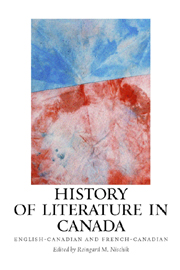Book contents
- Frontmatter
- Contents
- Acknowledgments
- Introduction: Writing a History of Literature in Canada
- I Beginnings
- II The Literature of New France, 1604–1760
- III The Literature of British Canada, 1763–1867
- IV From the Dominion to the Territorial Completion of the Nation, 1867–1918
- V The Modern Period, 1918–1967
- 11 Politics and Literature between Nationalism and Internationalism
- 12 English-Canadian Poetry, 1920–1960
- 13 The English-Canadian Novel and the Displacement of the Romance
- 14 The Modernist English-Canadian Short Story
- 15 Early English-Canadian Theater and Drama, 1918–1967
- 16 French Canada from the First World War to 1967: Historical Overview
- 17 French-Canadian Poetry up to the 1960s
- 18 The French-Canadian Novel between Tradition and Modernism
- 19 The French-Canadian Short Story
- 20 French-Canadian Drama from the 1930s to the Révolution tranquille
- VI Literature from 1967 to the Present
- Further Reading
- Notes on the Contributors
- Index
16 - French Canada from the First World War to 1967: Historical Overview
from V - The Modern Period, 1918–1967
Published online by Cambridge University Press: 12 September 2012
- Frontmatter
- Contents
- Acknowledgments
- Introduction: Writing a History of Literature in Canada
- I Beginnings
- II The Literature of New France, 1604–1760
- III The Literature of British Canada, 1763–1867
- IV From the Dominion to the Territorial Completion of the Nation, 1867–1918
- V The Modern Period, 1918–1967
- 11 Politics and Literature between Nationalism and Internationalism
- 12 English-Canadian Poetry, 1920–1960
- 13 The English-Canadian Novel and the Displacement of the Romance
- 14 The Modernist English-Canadian Short Story
- 15 Early English-Canadian Theater and Drama, 1918–1967
- 16 French Canada from the First World War to 1967: Historical Overview
- 17 French-Canadian Poetry up to the 1960s
- 18 The French-Canadian Novel between Tradition and Modernism
- 19 The French-Canadian Short Story
- 20 French-Canadian Drama from the 1930s to the Révolution tranquille
- VI Literature from 1967 to the Present
- Further Reading
- Notes on the Contributors
- Index
Summary
From the First World War to the Stock Market Crash
ON THE POLITICAL LEVEL, the end of the First World War brought no significant changes for Quebec: The province was governed by the Liberals (1897–1936), and it had not been forgotten that this party had spoken up for Louis Riel in 1885 and had supported pan-Canadian francophone nationalism under Honoré Mercier (prime minister 1887–1891). On the national level, the Liberals had found in Wilfred Laurier a prime minister (1896–1911) who was capable of compromise and was a skillful advocate for a federalist Canada. In addition, he knew how to mobilize the European immigrants and how to affect a rapprochement between his party and the French-Canadian bishops. The economic growth, which had carried over into the next century, further contributed to the positive image of the Liberals. In contrast, the conservative government in Ottawa, which had been in office since 1911, was criticized for entering the war (1914) as well as for the draft (1917), both of which actions Quebec had vehemently opposed. Thus the Liberals were in the voters' good graces in the provincial elections. The party question was overlaid with a second problem, namely that of the relationship and the representation of the two founding nations in the government. While the French-Canadian nationalists — among them Henri Bourassa — had, prior to the war, demanded a bicultural state that would accord both peoples equal rights throughout the nation, the majority of the anglophones only tolerated the French Canadians in Parliament and in Quebec.
- Type
- Chapter
- Information
- History of Literature in CanadaEnglish-Canadian and French-Canadian, pp. 222 - 227Publisher: Boydell & BrewerPrint publication year: 2008



